北师大版(2019)选择性必修 第一册Unit 2 Lesson 3 Getting to the Top 课件(共41张PPT)
文档属性
| 名称 | 北师大版(2019)选择性必修 第一册Unit 2 Lesson 3 Getting to the Top 课件(共41张PPT) |
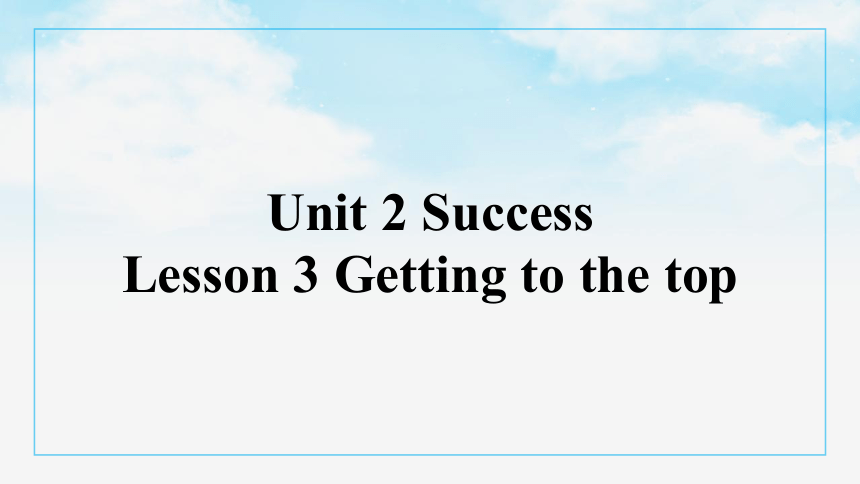
|
|
| 格式 | pptx | ||
| 文件大小 | 2.1MB | ||
| 资源类型 | 教案 | ||
| 版本资源 | 北师大版(2019) | ||
| 科目 | 英语 | ||
| 更新时间 | 2024-10-12 22:39:21 | ||
图片预览


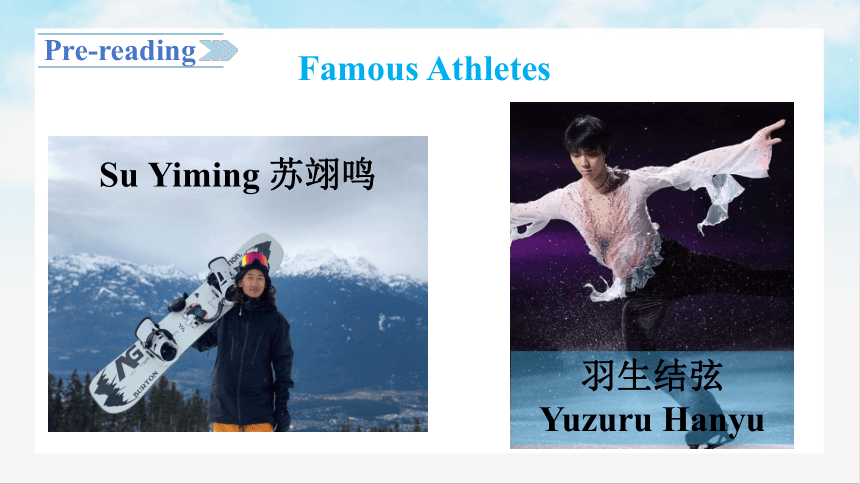
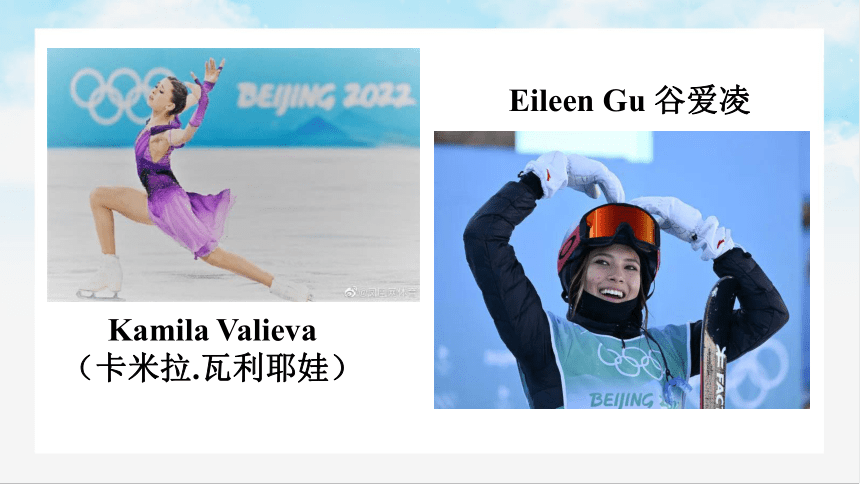
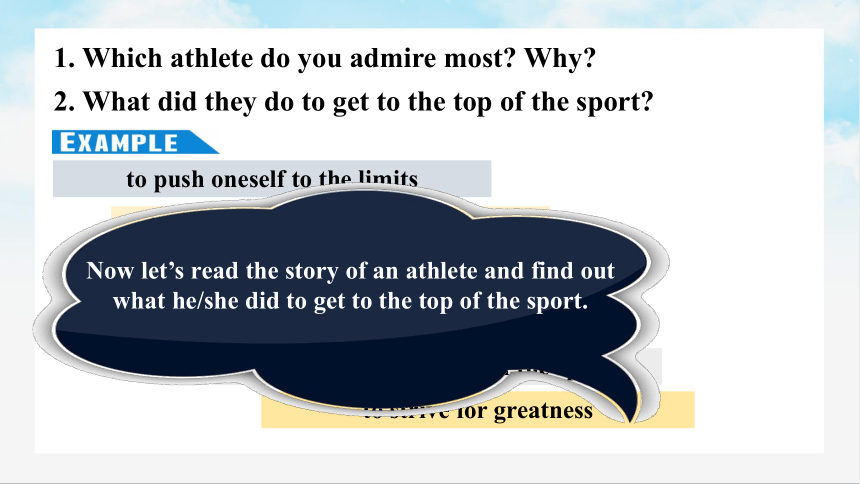
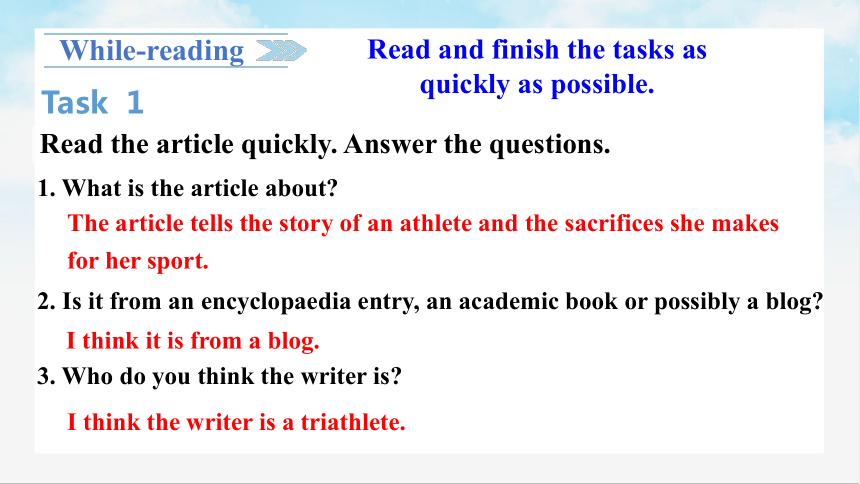
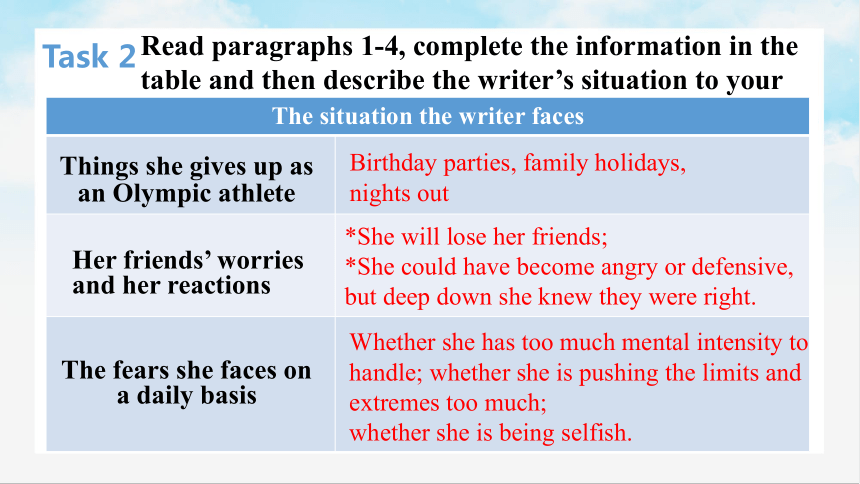

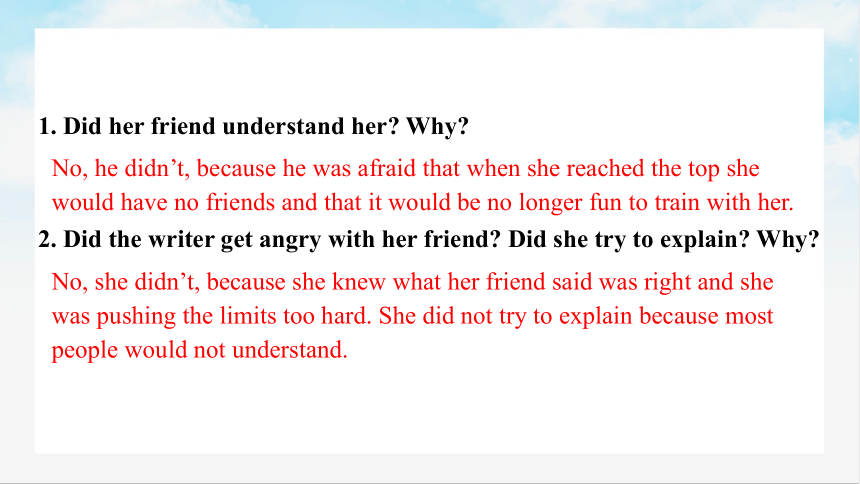
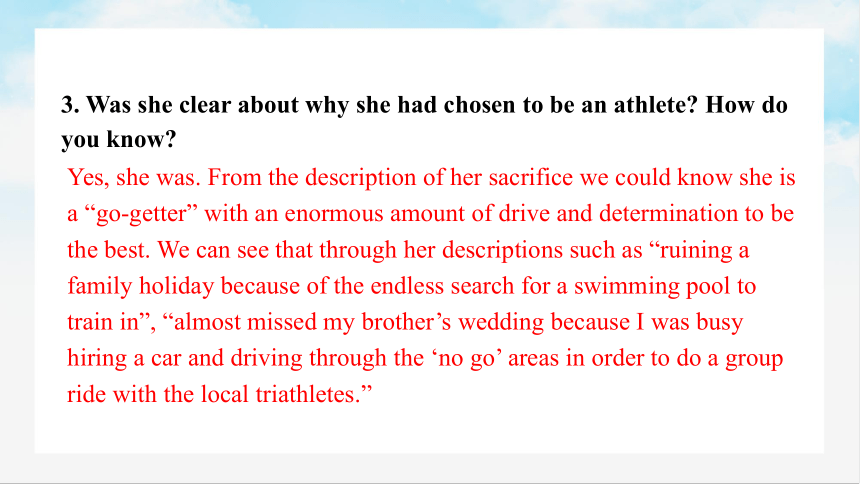
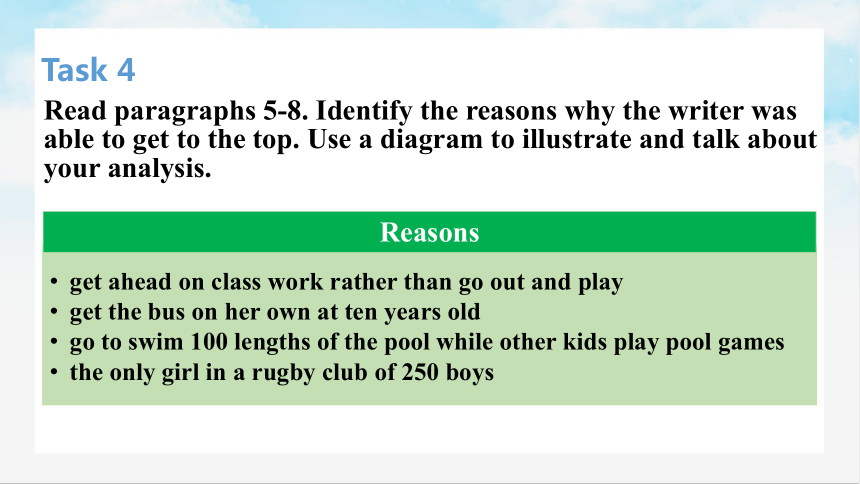
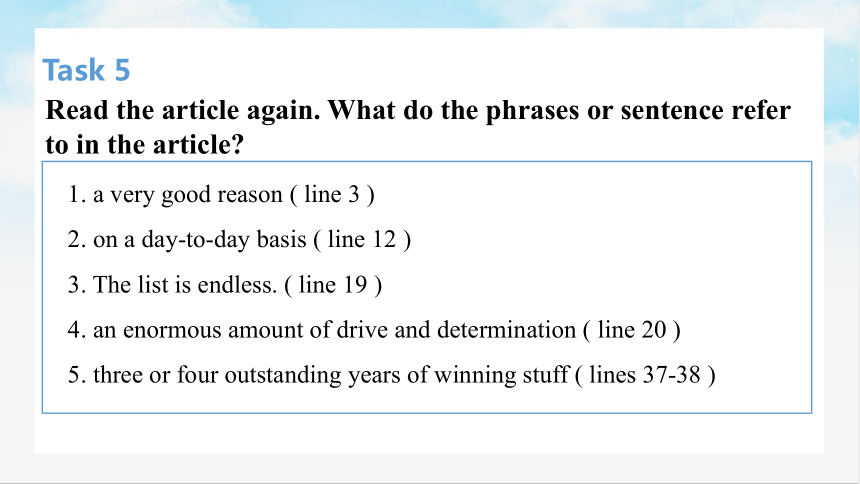
文档简介
(共41张PPT)
Unit 2 Success
Lesson 3 Getting to the top
To read about getting to the top
To read for general understanding
To read for specific information and understanding words in context
To learn about and practise identifying real information
To talk about the four most important things you need to get to the top
Learning objectives
Famous Athletes
Su Yiming 苏翊鸣
羽生结弦
Yuzuru Hanyu
Pre-reading
Kamila Valieva
(卡米拉.瓦利耶娃)
Eileen Gu 谷爱凌
1. Which athlete do you admire most Why
2. What did they do to get to the top of the sport
to strive for greatness
to push oneself to the limits
to give up everything for the sport
to live one’s life to extremes
to be willing to do the extra little bit
to be totally focused on the sport
Now let’s read the story of an athlete and find out what he/she did to get to the top of the sport.
Task 1
Read the article quickly. Answer the questions.
1. What is the article about
2. Is it from an encyclopaedia entry, an academic book or possibly a blog
3. Who do you think the writer is
I think the writer is a triathlete.
The article tells the story of an athlete and the sacrifices she makes for her sport.
I think it is from a blog.
While-reading
Read and finish the tasks as quickly as possible.
Task 2
Read paragraphs 1-4, complete the information in the table and then describe the writer’s situation to your partner.
The situation the writer faces
Things she gives up as
an Olympic athlete
Her friends’ worries and her reactions
Birthday parties, family holidays,
nights out
*She will lose her friends;
*She could have become angry or defensive, but deep down she knew they were right.
The fears she faces on
a daily basis
Whether she has too much mental intensity to handle; whether she is pushing the limits and extremes too much;
whether she is being selfish.
Task 3
Answer the questions based on what you have read.
1. Did her friend understand her Why
2. Did the writer get angry with her friend Did she try to explain Why
3. Was she clear about why she had chosen to be an athlete How do
you know
1. Did her friend understand her Why
2. Did the writer get angry with her friend Did she try to explain Why
No, he didn’t, because he was afraid that when she reached the top she would have no friends and that it would be no longer fun to train with her.
No, she didn’t, because she knew what her friend said was right and she was pushing the limits too hard. She did not try to explain because most people would not understand.
3. Was she clear about why she had chosen to be an athlete How do you know
Yes, she was. From the description of her sacrifice we could know she is a “go-getter” with an enormous amount of drive and determination to be the best. We can see that through her descriptions such as “ruining a family holiday because of the endless search for a swimming pool to train in”, “almost missed my brother’s wedding because I was busy hiring a car and driving through the ‘no go’ areas in order to do a group ride with the local triathletes.”
Task 4
Read paragraphs 5-8. Identify the reasons why the writer was able to get to the top. Use a diagram to illustrate and talk about your analysis.
Reasons
get ahead on class work rather than go out and play
get the bus on her own at ten years old
go to swim 100 lengths of the pool while other kids play pool games
the only girl in a rugby club of 250 boys
Task 5
Read the article again. What do the phrases or sentence refer to in the article
1. a very good reason ( line 3 )
2. on a day-to-day basis ( line 12 )
3. The list is endless. ( line 19 )
4. an enormous amount of drive and determination ( line 20 )
5. three or four outstanding years of winning stuff ( lines 37-38 )
it takes a lot to be at the top
every day
Check your answers:
Which statements do you think are true according to the article Why
1. The writer is a professional triathlete.
2. Her first sport was rugby.
3. At first, she was afraid to join the rugby club because it had 250 boys.
4. She missed many birthday parties, ruined family holidays and skipped nights out for the sport she devoted herself to.
5. What makes an Olympic champion stand out from other competitors is the special talent she or he has.
6. Although she knows that her way of life is unbalanced or unhealthy, she is determined to continue.
The writer says “These are the fears I face as a professional athlete on a day-to-day basis.” And she also mentions swimming and riding.
Because she says “l miss birthday parties, ruin family holidays and skip nights out” and “missing my brother’s wedding… in order to do a group ride with the local triathletes”.
We can see from “it is certainly not a balanced way to live and it is certainly not normal but those words are generally not used for anyone who is striving for greatness.”
Task 6
Skill Builder
Identifying Real Information
Sometimes, a task may contain questions with unreliable information or inaccurate interpretation. It is important to know how to identify what information is accurate (true) and what is inaccurate (false).
* Read the text to get the general idea.
* Then read the questions/statements and identify important words.
* Find the relevant part of the text and identify the important words.
* Decide if the important words in the questions / statements and the text express the same idea.
Task 7
Complete the summary using the correct form of the words and phrases below.
enormous outstanding extreme countless intensity length selfish normal boil down to apply myself
It 1. ____________ this: I was born with an 2. ________ amount of drive and determination. In my attempt to strive for greatness, I made 3.________ sacrifice, living my life to 4. ________ where every workout had a mental 5. ________ that seemed too much for most people. If you are not totally committed to your sport and want to lead a 6. _________ life, you can never be a(n) 7.____________ athlete, let alone an Olympic champion.
boils down to
enormous
extremes
countless
intensity
normal
outstanding
You may think it is unhealthy or 8. ________ to go to these 9. ________, but that is the way I roll, no matter what I’m 10. ______________ to.
selfish
lengths
applying myself
enormous outstanding extreme countless intensity length selfish normal boil down to apply myself
1. What are the three most important reasons why the writer was able to get to the top Find evidence to support your conclusion.
2. What is your opinion about the writer’s attitude and commitment to the profession she has chosen
Post-reading
1. What are the three most important reasons why the writer was able to get to the top Find evidence to support your conclusion.
Possible answers:
Reason 1
She was born with an enormous amount of drive and determination (in para. 5).
Reason 2
Reason 3
She has always lived her life to extremes, whatever it is she is applying herself to (in para. 6).
As a professional athlete she is prepared to do that little extra in her preparation that sets her apart from her competitors
(in para. 8).
2. What is your opinion about the writer's attitude and commitment to the profession she has chosen
Possible answers:
I think she will get to the top because she has so much commitment to the profession she has chosen and she is so determined to be the best.
Choose the four most important things you need to get to the
top. Then rank your choices from 1 (most important) to 4 (least important).
Share your list with the other group members. Give reasons for your choices.
Group work
*intelligence *determination
*patience *mental toughness
*concentration *self-discipline
Complete the summary using the correct form of the words and phrases below.
enormous outstanding extreme countless intensity length selfish normal boil down to apply myself
It (1) _____________this: I was born with an (2) _____________ amount of drive and determination. In my attempt to strive for greatness, I made (3) _____________ sacrifice, living my life to (4) __________ where every workout had a mental (5) ___________ that seemed too much for most people.
boils down to
enormous
countless
extremes
intensity
If you are not totally committed to your sport and want to lead a (6) _________ life, you can never be a(n) (7) ___________ athlete, let alone an Olympic champion. You may think it is unhealthy or (8) __________ to go to these (9) ___________, but that is the way I roll, no matter what I’m (10) ________________ to.
normal
outstanding
selfish
lengths
applying myself
enormous outstanding extreme countless intensity length selfish normal boil down to apply myself
1. Why do Olympic athletes push themselves to the limits
为什么奥林匹克运动员要将自己逼到极限呢?
push sb. to the limit 把某人推到极限
e.g. She pushed me to the limit of my abilities.
她逼着我把自己的能力发挥到了极限。
Language points
2. I miss birthday parties, ruin family holidays and skip nights out …
我错过生日聚会,破坏家庭旅行,放弃夜晚外出……
1) ruin v. to spoil or destroy pletely
糟蹋; 破坏
n. the part of a building that is left after the rest has been destroyed 废墟
e.g. The bad weather ruined our trip.
天气恶劣, 破坏了我们的旅行。
There’s an interesting old ruin at the top of that hill.
在那座山顶上有一处有意思的古老废墟。
in ruins 毁坏; 严重受损; 破败不堪
e.g. The castle now lies in ruins.
那座城堡现在已破败不堪了。
翻译下列句子。
1) 这个错误断送了他得到这份工作的机会。
The mistake ruined his chance of getting the job.
2) 在可怕的15秒钟之内,一座大城市就沦为一片废墟。
In fifteen terrible seconds a large city lay in ruins.
2) skip v. to not do sth. that you usually do or should do
不做(本来常做或应做的事)
to move forward with quick steps and jumps
蹦跳着走
e.g. She skipped lunch in order to go shopping.
为了去购物,她没有吃午饭。
He turned and skipped away, singing happily to himself.
他转身蹦蹦跳跳地走了,嘴里高兴地哼着歌。
翻译下面句子。
1) He skipped school again.
2) She skipped the problems she couldn’t do.
3) I skipped lunch and went shopping instead.
4) The little girl skipped along at her mother’s side.
他又逃学了。
她跳过不会做的题目。
我没吃午饭,去购物了。
小女孩蹦蹦跳跳地走在母亲一旁。
3. It boils down to this: I was born with an enormous amount of drive and determination.
归根结底, 我天生就是个特别有干劲儿和意志力的人。
1) boil down to sth. :
to be the main reason for sth or the most basic part of sth.
归结为,要点是
e.g. The reason for stopping the project boils down to lack of money.
停止这个项目的原因归结为缺乏资金。
boil with rage 怒火中烧; 异常气愤
e.g. Hearing the news, Li Ming was boiling with rage.
听到这个消息后, 李明勃然大怒。
2) be born with 与生俱来
e.g. He suggested that human infants are born with the ability to learn language.
他提出人类学习语言的能力是与生俱来的。
be born in +某地 出生于某地
be born in / on +时间 出生于某时
be born into ... 出生于……的家庭
be born of / to ... 生身父母是……
介词填空
1) She was born _______ a very musical family.
2) The writer was born _______ 1850.
3) She was born _______ American parents.
4) The child was born _______ a weak heart.
with
into
in
of / to
4. Call it unhealthy if you want, but that is the way I roll, no matter what it is I’m applying myself to.
你若说这是一种病态也行,但这就是我的做事风格,不管做什么我都会全力以赴。
apply oneself to sth. / doing sth.
使(自己)致力于; 使(注意力等)专注于
to 是介词
e.g. He applied himself to learning French.
他致力于学习法语。
apply to 牵涉到; 运用于; 向……询问
apply (to sb.) for sth. (向某人)申请某物
apply sth. to 把……运用于……
be applied to 适用于; 应用于; 施加于
翻译下列句子。
1) 这项新技术已应用于农业。
2) 安全驾驶的条例适用于每一个人。
3) 他向公安部门申请了护照。
4) 如果你致力于手头的工作, 你很快就能完成它。
The new technology has been applied to farming.
The rules of safe driving apply to everyone.
He applied to the police for a passport.
If you apply yourself to the job in hand, you'll soon finish it.
5. If you want to be an Olympic champion, it’s all about that little extra thing you have done in your preparation that will set you apart from your competitors.
如果你想成为奥运冠军, 就要在训练中多付出额外的一点点, 它将使你从竞争者中脱颖而出。
apart from 除……之外
e.g. Apart from the ending, it's a really good film.
除去结尾部分,这是一部很好的电影。
set sb. / sth. apart from 使某人或某物与众不同
e.g. Her bright red scarf set her apart from the other girls.
那鲜红的围巾使她在姑娘们中间特别引人注目。
翻译下面句子。
1) 我们玩得很高兴,可就是天气不大好。
2) 除了服务好,饭店还提供了不同种类的传统福建菜。
We had a good time, apart from the weather.
Apart from good service, the restaurant offers different kinds of traditional Fujian dishes.
6. I’d prefer to have three or four outstanding years of winning stuff than having ten years of being average.
我宁愿有三到四年的胜利辉煌,而不选择十年的平庸无为。
average
adj. calculated by adding several amounts together, finding a total, and dividing the total by the number of amounts 平均的
ordinary; not special 普通的; 平庸的
n. the result of adding several amounts together, finding a total, and dividing the total by the number of amounts 平均数
a level which is usual 平均水平
on average 平均
above / below average 高于/低于平均水平
e.g.
On average, women live between five and seven years longer than men.
The school’s eighth-graders are above average in science.
The quality of the goods is well below average.
汉译英。
1) 这些分数远在平均水平以上。
These marks are well above average.
2) 学生的平均年龄是19岁。
The average age of the students is 19.
3) 我们平均每天会收到5封信。
On average, we receive five letters each day.
Create a poster with ideas how you can succeed at school or how you can get to the top of things you want to.
Homework
Unit 2 Success
Lesson 3 Getting to the top
To read about getting to the top
To read for general understanding
To read for specific information and understanding words in context
To learn about and practise identifying real information
To talk about the four most important things you need to get to the top
Learning objectives
Famous Athletes
Su Yiming 苏翊鸣
羽生结弦
Yuzuru Hanyu
Pre-reading
Kamila Valieva
(卡米拉.瓦利耶娃)
Eileen Gu 谷爱凌
1. Which athlete do you admire most Why
2. What did they do to get to the top of the sport
to strive for greatness
to push oneself to the limits
to give up everything for the sport
to live one’s life to extremes
to be willing to do the extra little bit
to be totally focused on the sport
Now let’s read the story of an athlete and find out what he/she did to get to the top of the sport.
Task 1
Read the article quickly. Answer the questions.
1. What is the article about
2. Is it from an encyclopaedia entry, an academic book or possibly a blog
3. Who do you think the writer is
I think the writer is a triathlete.
The article tells the story of an athlete and the sacrifices she makes for her sport.
I think it is from a blog.
While-reading
Read and finish the tasks as quickly as possible.
Task 2
Read paragraphs 1-4, complete the information in the table and then describe the writer’s situation to your partner.
The situation the writer faces
Things she gives up as
an Olympic athlete
Her friends’ worries and her reactions
Birthday parties, family holidays,
nights out
*She will lose her friends;
*She could have become angry or defensive, but deep down she knew they were right.
The fears she faces on
a daily basis
Whether she has too much mental intensity to handle; whether she is pushing the limits and extremes too much;
whether she is being selfish.
Task 3
Answer the questions based on what you have read.
1. Did her friend understand her Why
2. Did the writer get angry with her friend Did she try to explain Why
3. Was she clear about why she had chosen to be an athlete How do
you know
1. Did her friend understand her Why
2. Did the writer get angry with her friend Did she try to explain Why
No, he didn’t, because he was afraid that when she reached the top she would have no friends and that it would be no longer fun to train with her.
No, she didn’t, because she knew what her friend said was right and she was pushing the limits too hard. She did not try to explain because most people would not understand.
3. Was she clear about why she had chosen to be an athlete How do you know
Yes, she was. From the description of her sacrifice we could know she is a “go-getter” with an enormous amount of drive and determination to be the best. We can see that through her descriptions such as “ruining a family holiday because of the endless search for a swimming pool to train in”, “almost missed my brother’s wedding because I was busy hiring a car and driving through the ‘no go’ areas in order to do a group ride with the local triathletes.”
Task 4
Read paragraphs 5-8. Identify the reasons why the writer was able to get to the top. Use a diagram to illustrate and talk about your analysis.
Reasons
get ahead on class work rather than go out and play
get the bus on her own at ten years old
go to swim 100 lengths of the pool while other kids play pool games
the only girl in a rugby club of 250 boys
Task 5
Read the article again. What do the phrases or sentence refer to in the article
1. a very good reason ( line 3 )
2. on a day-to-day basis ( line 12 )
3. The list is endless. ( line 19 )
4. an enormous amount of drive and determination ( line 20 )
5. three or four outstanding years of winning stuff ( lines 37-38 )
it takes a lot to be at the top
every day
Check your answers:
Which statements do you think are true according to the article Why
1. The writer is a professional triathlete.
2. Her first sport was rugby.
3. At first, she was afraid to join the rugby club because it had 250 boys.
4. She missed many birthday parties, ruined family holidays and skipped nights out for the sport she devoted herself to.
5. What makes an Olympic champion stand out from other competitors is the special talent she or he has.
6. Although she knows that her way of life is unbalanced or unhealthy, she is determined to continue.
The writer says “These are the fears I face as a professional athlete on a day-to-day basis.” And she also mentions swimming and riding.
Because she says “l miss birthday parties, ruin family holidays and skip nights out” and “missing my brother’s wedding… in order to do a group ride with the local triathletes”.
We can see from “it is certainly not a balanced way to live and it is certainly not normal but those words are generally not used for anyone who is striving for greatness.”
Task 6
Skill Builder
Identifying Real Information
Sometimes, a task may contain questions with unreliable information or inaccurate interpretation. It is important to know how to identify what information is accurate (true) and what is inaccurate (false).
* Read the text to get the general idea.
* Then read the questions/statements and identify important words.
* Find the relevant part of the text and identify the important words.
* Decide if the important words in the questions / statements and the text express the same idea.
Task 7
Complete the summary using the correct form of the words and phrases below.
enormous outstanding extreme countless intensity length selfish normal boil down to apply myself
It 1. ____________ this: I was born with an 2. ________ amount of drive and determination. In my attempt to strive for greatness, I made 3.________ sacrifice, living my life to 4. ________ where every workout had a mental 5. ________ that seemed too much for most people. If you are not totally committed to your sport and want to lead a 6. _________ life, you can never be a(n) 7.____________ athlete, let alone an Olympic champion.
boils down to
enormous
extremes
countless
intensity
normal
outstanding
You may think it is unhealthy or 8. ________ to go to these 9. ________, but that is the way I roll, no matter what I’m 10. ______________ to.
selfish
lengths
applying myself
enormous outstanding extreme countless intensity length selfish normal boil down to apply myself
1. What are the three most important reasons why the writer was able to get to the top Find evidence to support your conclusion.
2. What is your opinion about the writer’s attitude and commitment to the profession she has chosen
Post-reading
1. What are the three most important reasons why the writer was able to get to the top Find evidence to support your conclusion.
Possible answers:
Reason 1
She was born with an enormous amount of drive and determination (in para. 5).
Reason 2
Reason 3
She has always lived her life to extremes, whatever it is she is applying herself to (in para. 6).
As a professional athlete she is prepared to do that little extra in her preparation that sets her apart from her competitors
(in para. 8).
2. What is your opinion about the writer's attitude and commitment to the profession she has chosen
Possible answers:
I think she will get to the top because she has so much commitment to the profession she has chosen and she is so determined to be the best.
Choose the four most important things you need to get to the
top. Then rank your choices from 1 (most important) to 4 (least important).
Share your list with the other group members. Give reasons for your choices.
Group work
*intelligence *determination
*patience *mental toughness
*concentration *self-discipline
Complete the summary using the correct form of the words and phrases below.
enormous outstanding extreme countless intensity length selfish normal boil down to apply myself
It (1) _____________this: I was born with an (2) _____________ amount of drive and determination. In my attempt to strive for greatness, I made (3) _____________ sacrifice, living my life to (4) __________ where every workout had a mental (5) ___________ that seemed too much for most people.
boils down to
enormous
countless
extremes
intensity
If you are not totally committed to your sport and want to lead a (6) _________ life, you can never be a(n) (7) ___________ athlete, let alone an Olympic champion. You may think it is unhealthy or (8) __________ to go to these (9) ___________, but that is the way I roll, no matter what I’m (10) ________________ to.
normal
outstanding
selfish
lengths
applying myself
enormous outstanding extreme countless intensity length selfish normal boil down to apply myself
1. Why do Olympic athletes push themselves to the limits
为什么奥林匹克运动员要将自己逼到极限呢?
push sb. to the limit 把某人推到极限
e.g. She pushed me to the limit of my abilities.
她逼着我把自己的能力发挥到了极限。
Language points
2. I miss birthday parties, ruin family holidays and skip nights out …
我错过生日聚会,破坏家庭旅行,放弃夜晚外出……
1) ruin v. to spoil or destroy pletely
糟蹋; 破坏
n. the part of a building that is left after the rest has been destroyed 废墟
e.g. The bad weather ruined our trip.
天气恶劣, 破坏了我们的旅行。
There’s an interesting old ruin at the top of that hill.
在那座山顶上有一处有意思的古老废墟。
in ruins 毁坏; 严重受损; 破败不堪
e.g. The castle now lies in ruins.
那座城堡现在已破败不堪了。
翻译下列句子。
1) 这个错误断送了他得到这份工作的机会。
The mistake ruined his chance of getting the job.
2) 在可怕的15秒钟之内,一座大城市就沦为一片废墟。
In fifteen terrible seconds a large city lay in ruins.
2) skip v. to not do sth. that you usually do or should do
不做(本来常做或应做的事)
to move forward with quick steps and jumps
蹦跳着走
e.g. She skipped lunch in order to go shopping.
为了去购物,她没有吃午饭。
He turned and skipped away, singing happily to himself.
他转身蹦蹦跳跳地走了,嘴里高兴地哼着歌。
翻译下面句子。
1) He skipped school again.
2) She skipped the problems she couldn’t do.
3) I skipped lunch and went shopping instead.
4) The little girl skipped along at her mother’s side.
他又逃学了。
她跳过不会做的题目。
我没吃午饭,去购物了。
小女孩蹦蹦跳跳地走在母亲一旁。
3. It boils down to this: I was born with an enormous amount of drive and determination.
归根结底, 我天生就是个特别有干劲儿和意志力的人。
1) boil down to sth. :
to be the main reason for sth or the most basic part of sth.
归结为,要点是
e.g. The reason for stopping the project boils down to lack of money.
停止这个项目的原因归结为缺乏资金。
boil with rage 怒火中烧; 异常气愤
e.g. Hearing the news, Li Ming was boiling with rage.
听到这个消息后, 李明勃然大怒。
2) be born with 与生俱来
e.g. He suggested that human infants are born with the ability to learn language.
他提出人类学习语言的能力是与生俱来的。
be born in +某地 出生于某地
be born in / on +时间 出生于某时
be born into ... 出生于……的家庭
be born of / to ... 生身父母是……
介词填空
1) She was born _______ a very musical family.
2) The writer was born _______ 1850.
3) She was born _______ American parents.
4) The child was born _______ a weak heart.
with
into
in
of / to
4. Call it unhealthy if you want, but that is the way I roll, no matter what it is I’m applying myself to.
你若说这是一种病态也行,但这就是我的做事风格,不管做什么我都会全力以赴。
apply oneself to sth. / doing sth.
使(自己)致力于; 使(注意力等)专注于
to 是介词
e.g. He applied himself to learning French.
他致力于学习法语。
apply to 牵涉到; 运用于; 向……询问
apply (to sb.) for sth. (向某人)申请某物
apply sth. to 把……运用于……
be applied to 适用于; 应用于; 施加于
翻译下列句子。
1) 这项新技术已应用于农业。
2) 安全驾驶的条例适用于每一个人。
3) 他向公安部门申请了护照。
4) 如果你致力于手头的工作, 你很快就能完成它。
The new technology has been applied to farming.
The rules of safe driving apply to everyone.
He applied to the police for a passport.
If you apply yourself to the job in hand, you'll soon finish it.
5. If you want to be an Olympic champion, it’s all about that little extra thing you have done in your preparation that will set you apart from your competitors.
如果你想成为奥运冠军, 就要在训练中多付出额外的一点点, 它将使你从竞争者中脱颖而出。
apart from 除……之外
e.g. Apart from the ending, it's a really good film.
除去结尾部分,这是一部很好的电影。
set sb. / sth. apart from 使某人或某物与众不同
e.g. Her bright red scarf set her apart from the other girls.
那鲜红的围巾使她在姑娘们中间特别引人注目。
翻译下面句子。
1) 我们玩得很高兴,可就是天气不大好。
2) 除了服务好,饭店还提供了不同种类的传统福建菜。
We had a good time, apart from the weather.
Apart from good service, the restaurant offers different kinds of traditional Fujian dishes.
6. I’d prefer to have three or four outstanding years of winning stuff than having ten years of being average.
我宁愿有三到四年的胜利辉煌,而不选择十年的平庸无为。
average
adj. calculated by adding several amounts together, finding a total, and dividing the total by the number of amounts 平均的
ordinary; not special 普通的; 平庸的
n. the result of adding several amounts together, finding a total, and dividing the total by the number of amounts 平均数
a level which is usual 平均水平
on average 平均
above / below average 高于/低于平均水平
e.g.
On average, women live between five and seven years longer than men.
The school’s eighth-graders are above average in science.
The quality of the goods is well below average.
汉译英。
1) 这些分数远在平均水平以上。
These marks are well above average.
2) 学生的平均年龄是19岁。
The average age of the students is 19.
3) 我们平均每天会收到5封信。
On average, we receive five letters each day.
Create a poster with ideas how you can succeed at school or how you can get to the top of things you want to.
Homework
同课章节目录
- Unit 1 Relationshis
- Lesson 1 Teachers
- Lesson 2 How Do We Like Teachers’ Feedback?
- Lesson 3 So Close,Yet So Fa
- Unit 2 Success
- Lesson 1 Money vs Success
- Lesson 2 Top Five Secrets of Success
- Lesson 3 Getting to the Top
- Unit 3 Conservation
- Lesson 1 The Sixth Extinction
- Lesson 2 War on Plastic Packets
- Lesson 3 The Road to Destruction
